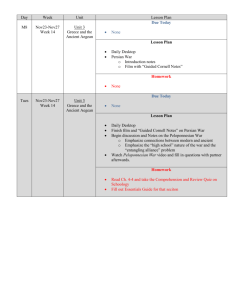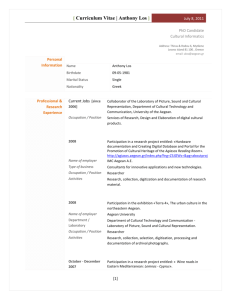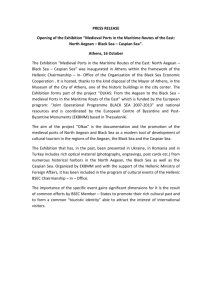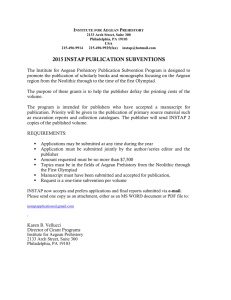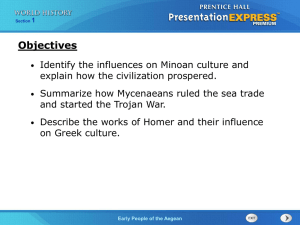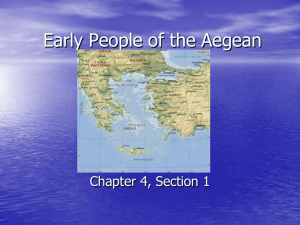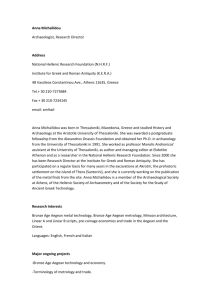Daidalou 10 Str Mytilene, Greece +302251026344/ mobile: +
advertisement
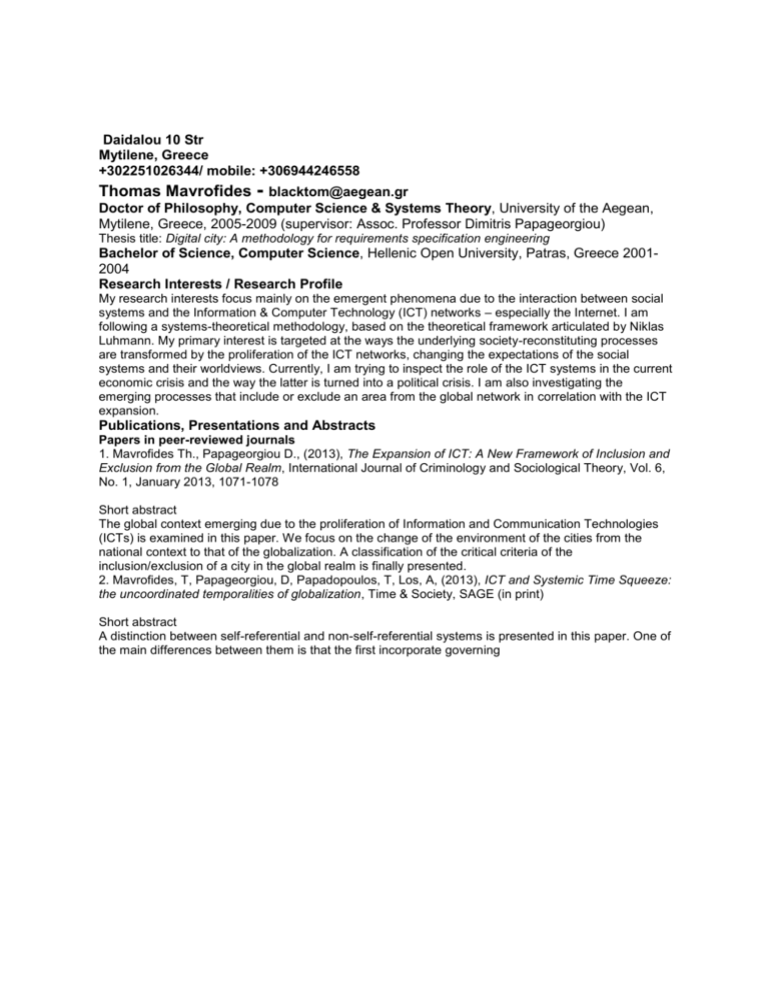
Daidalou 10 Str Mytilene, Greece +302251026344/ mobile: +306944246558 Thomas Mavrofides - blacktom@aegean.gr Doctor of Philosophy, Computer Science & Systems Theory, University of the Aegean, Mytilene, Greece, 2005-2009 (supervisor: Assoc. Professor Dimitris Papageorgiou) Thesis title: Digital city: A methodology for requirements specification engineering Bachelor of Science, Computer Science, Hellenic Open University, Patras, Greece 20012004 Research Interests / Research Profile My research interests focus mainly on the emergent phenomena due to the interaction between social systems and the Information & Computer Technology (ICT) networks – especially the Internet. I am following a systems-theoretical methodology, based on the theoretical framework articulated by Niklas Luhmann. My primary interest is targeted at the ways the underlying society-reconstituting processes are transformed by the proliferation of the ICT networks, changing the expectations of the social systems and their worldviews. Currently, I am trying to inspect the role of the ICT systems in the current economic crisis and the way the latter is turned into a political crisis. I am also investigating the emerging processes that include or exclude an area from the global network in correlation with the ICT expansion. Publications, Presentations and Abstracts Papers in peer-reviewed journals 1. Mavrofides Th., Papageorgiou D., (2013), The Expansion of ICT: A New Framework of Inclusion and Exclusion from the Global Realm, International Journal of Criminology and Sociological Theory, Vol. 6, No. 1, January 2013, 1071-1078 Short abstract The global context emerging due to the proliferation of Information and Communication Technologies (ICTs) is examined in this paper. We focus on the change of the environment of the cities from the national context to that of the globalization. A classification of the critical criteria of the inclusion/exclusion of a city in the global realm is finally presented. 2. Mavrofides, T, Papageorgiou, D, Papadopoulos, T, Los, A, (2013), ICT and Systemic Time Squeeze: the uncoordinated temporalities of globalization, Time & Society, SAGE (in print) Short abstract A distinction between self-referential and non-self-referential systems is presented in this paper. One of the main differences between them is that the first incorporate governing systems in their constitutive structure, whereas the latter do not. As a result “the markets” (a non-selfreferential system) when coupled with the Internet, can function very fast in comparison to the democratic regimes. Democracies, on the other hand, consume time in order to maintain their basic organization (democratic) and are tied to time. Therefore, when democracies interact with the markets which are coupled with the internet, the investment risk is transformed into political risk, absorbed by the democratic governments who endanger their legitimacy with respect to their constituencies. 3. Mavrofides, T., Kameas, A., Papageorgiou, D. and Los, A. (2011), On the Entropy of Social Systems: A Revision of the Concepts of Entropy and Energy in the Social Context, Systems Research & Behavioral Science, 28: 353–368. doi: 10.1002/sres.1084 Short abstract This paper initially draws distinct lines between the two meanings of entropy, namely the thermodynamic entropy which is correlated with the notion of energy, and the statistical entropy which is correlated with the concept of organization. Subsequently the paper builds on the Niklas Luhmann’s theory of social systems, underlining that statistical entropy (uncertainty) is a sine qua non for the circular reconstruction of social systems. Finally, the paper investigates the possible meaning of “energy” (and thus thermodynamic entropy) for the social systems, bringing Pierre Bourdieu’s theory of social capital in a Luhmannian context. 4. Τsekouras G.E., Kalloniatis C., Kavakli E., and Mavrofides T., (2004), A Fuzzy Clustering-Based Algorithm for Fuzzy Modeling, WSEAS Transactions on Systems, Vol. 3, Issue 5., pp. 1958-1963, 2004 5. Tsekouras G.E., Kalloniatis C., and Mavrofides T., (2004), Fuzzy Modeling via Optimal Fuzzy Clustering, WSEAS Transactions on Systems, Vol. 3, Issue 5, pp. 1977-1982, 2004 Papers in peer-reviewed conferences 6. Papageorgiou, D., Mavrofides, T., (2011), Soccer and Organized Fan-Clubs: Violence as a Communication System, Conference On Sports, Social Practices and Fan Clubs in Greece, Athens, Panteion University, May 27-28, 2011 Short abstract Usually, the soccer fan-clubs and the cases of the “hooligans” are considered as symptoms of social disorganization. This paper examines the phenomena of violent clashes between fan-clubs of different soccer teams as a form of organization of their communication. 7. Mavrofides, T., (2011), The meaning of the Border and the Border of the Meaning, First EastBordNet Conference "Remaking Borders", Catania, Sicily, 20-22 January 2011 Short abstract This paper on the basic concepts of radical constructivism as articulated by George Spencer-Brown, Heinz von Foerster, Gregory Bateson and Niklas Luhmann. The concept of the border is presented as the basic prerequisite before any notion of “the world” can emerge. Eventually, the society is presented as a system that is the evolving outcome of the continuous redefinition of boundaries, in contrary with the concept of “deregulation” that overlooks that certain norms and structures are in fact the “memory” of the society, reflecting its evolution. 8. Mavrοfides, T.(2010), From Humans to Persons: Niklas Luhmann´s Posthumanism, Audiovisual Posthumanism Conference: Aesthetics, Cultural Theory and the Arts, Mytilene, 23-27 September 2010 Short abstract This presentation is an analysis of the polemic usually targeting Niklas Luhmann’s theoretical concepts. First, the most common objections are presented among with their arguments. Next, the basic concepts of Niklas Luhmann’s theory of social systems are introduced and finally, it is proven that that theory cannot be considered anti-humanistic, but on the contrary, a theory that “took the individuals very seriously” as Luhmann himself maintained. 9. Mavrofides, T., Papageorgiou, D., Kameas, A, (2010), Science as a second-order observer: proposing a Reference Influence Factor, 14th World Multiconference on Systemics, Cybernetics and Informatics (WMSCI 2010),Orlando, USA, June 29th to July 2nd, 2010, conference proceedings, vol. III, 186-191. Short abstract This paper originated from a lengthy discussion among academics, about the importance of the “impact factor” of the academic journals. In the first part of the paper, the method of calculating the “impact factor” is introduced. Secondly, the “impact factor” as an evaluation method is itself evaluated (thus the term “second-order”). Finally, a new evaluation method with obvious advantages over the “impact factor” is proposed (the “influence factor”), based on the subjectivity (rather than the disputable objectivity) of the scholars, authors and academics. 10. Mavrofides, T., Papageorgiou, D., (2010), The expansion of ICT: a new framework of inclusion and exclusion from the global realm, 6th National & International HSSS Conference , "Systemic Approaches in Social Structures", 23rd - 26th June, 2010, Mitilini, Greece Short abstract The global context emerging due to the proliferation of Information and Communication Technologies (ICTs) is examined in this paper. We focus on the change of the environment of the cities from the national context to that of the globalization. A classification of the critical criteria of the inclusion/exclusion of a city in the global realm is finally presented. 11. Papageorgiou, D., Mavrofides, T., (2010), Greece and Cultural Policies, International Conference on Cultural Policies, May 21-24, Chios, Greece Short abstract This presentation focuses on the possibilities offered by the Information and Communication Technologies (ICTs) for the organization, preservation and presentation of the culture and cultural heritage. Greece is used here as case-study and many of the research projects of the Dpt. Of Cultural Technology and Communication are used as examples. 12. Mavrofides, T., Papageorgiou, D., (2009), Regional participation in the global network: exclusion and integration as a result of the utilization of ICTs, 2nd Greek-Russian Social & Scientific Forum, St Petersburg, Russia, June 14-18, 2009 Short abstract This paper examines the expanding environment of cities and wider regions (which are considered systems). The national ties of certain cities (the “global cities”) are dropped gradually, in favor of a new environment emerging due to the proliferation of ICTs. Thus, those cities (e.g. London, New York, Shanghai, Sao Paulo etc.) are articulating a global network, realized by interactions facilitated by the ICT networks. 13. Papageorgiou, D., Mavrofides, T., (2006), Cultural Representation and new technologies: problems and perspectives, Cultural Convergence and New Technologies Conference, Athens, Greece, 2006 Short abstract This paper examines the applications of the ICTs (Information and Communication Technologies) in the fields of the organization, preservation and presentation of the culture and cultural heritage, focusing on the problems emerging when the concept of meaning is cut-off from its original context, that is, the space and time where the cultural event takes place. 14. Pehlivanides, G., Mavrofides, T., Papageorgiou, D., (2006), Investigating Alternative ways of Interacting with Cultural Content: From Graphical User Interface to Customizable User Interface Design, 4th International Symposium of Interactive Media Design, Istanbul, Turkey, 2006 Short abstract A paper that is a report on an experimental installation designed by G. Pehlivanides and developed by me, using sensors and special software in order to make a game whereas the players are walking on a map of Lesvos island, and inspecting the various cultural characteristics of different regions. The installation was deployed in 2004. 15. Tsekouras, G.E., Kalloniatis, C., Mavrofides, T., (2004), Fuzzy Modeling via Optimal Fuzzy Clustering, WSEAS International Conference on Systems, Athens, 2004 16. Tsekouras, G.E., Kalloniatis, C., Kavakli, E., Mavrofides, T., (2004), A Fuzzy Clustering-Based Algorithm for Fuzzy Modeling, WSEAS International Conference on Systems, Athens, 2004 Chapters in Books 17. Papageorgiou, D., Chatzigeorgiou, T., Mavrofides, T., (2011), “Liquid” Borders as practices: The case of the Greek island of Lesvos (19th-21st centuries), in: Dascalopoulou S., Aligisakis M. (eds.), La question intercultural (in press) Short abstract This paper examines the differences between national borders that function as strict boundaries and “liquid” borders, that is, the conceptual boundaries between different cultures that find themselves in interaction with each other. We examine the case of Lesvos island, and the phenomenon of smuggling goods between Greece and Turkey especially in the mid-20th century, as an interaction between similar cultures in neighboring regions. 18. Mavrofides, T., (2006), Cultural Representation from the viewpoint of Computer Science, in Cultural Representation, Papageorgiou D. (ed), Kritiki Editions, Athens. Short abstract This paper presents and classifies the best methods of software designing / developing / deploying (i.e. software life-cycle) for applications that are targeting to the management, preservation and presentation of the cultural “wealth”. A hypothetical case-study is used as to exemplify on the suggested paradigm, which (the paradigm) is the outcome of 15 years of experience of the Laboratory of Image, Sound and Cultural Representation of the University of the Aegean. Research Experience 1. Digital Chart of the traditional occupations in the North Aegean Sea (2008) • Dept. of Cultural Technology & Communication, University of the Aegean, Mytilene, Lesvos – Greece, 2008 • Project description: A project to develop an online Content Management System (CMS) to facilitate researchers who may be interested in the traditional occupations in the North Aegean Sea • Position: Head Software Engineer 2. Development of an online repository for the Agiasos Read-Room (2006) • Dept. of Cultural Technology & Communication, University of the Aegean, Mytilene, Lesvos – Greece, 2006 • Project description: A project to develop an online Content Management System (CMS) to facilitate researchers who may be interested in the activities of the one-century old Cultural Association of the town of Agiasos, Lesvos • Position: Head Software Engineer 3. Development of an online repository of the traditional music in the North Aegean Sea (2007) • Dept. of Cultural Technology & Communication, University of the Aegean, Mytilene, Lesvos – Greece, 2007 • Project description: A project to develop an online Content Management System (CMS) to facilitate researchers who may be interested in the traditional music of N. Aegean Sea • Position: Head Software Engineer – assistant researcher 4. The traditional Hamlet of Anavatos (2004) • Dept. of Cultural Technology & Communication, University of the Aegean, Mytilene, Lesvos – Greece, 2004 • Project description: A project to present the hamlet of Anavatos-Chios, designing and developing innovative software • Position: Head Software Engineer – field researcher 5. NAIAS (North Aegean Innovation Actions and Support) (2000) • Dept. of Cultural Technology & Communication, University of the Aegean, Mytilene, Lesvos – Greece, 2000 • Project description: A project to support the private sector in the Aegean sea, in order to undertake innovative actions (2000) • Position: Head Software Engineer 6. ALAS (All About Salt)(2002-2004) • Dept. of Cultural Technology & Communication, University of the Aegean, Mytilene, Lesvos – Greece 2002 • Project description: A research project on the traditional Salinas in the Mediterranean • Position: Head Software Engineer 7. Musical Crossroads in the Aegean Sea (1998) • Dept. of Social Anthropology, University of the Aegean, Mytilene, Lesvos – Greece, 1998 • Project description: A research on the practices and the sub-cultures of the musicians in the Aegean Sea, during the late 19th century, until the 1970s. (1997-1998) • Position: Software Programmer Teaching Experience Lecturer: City and Environment – applied and Clinical Sociology - Postgraduate Course, Dpt of Sociology, University of the Aegean, Mytilene, Spring 2010, 2011 • An introduction to the basic concepts of systemic sociology; the city as system; the city as an artifact; urbanization; globalization as a system of cities (lectures). Teaching Assistant: Interactive design – Postgraduate Course, Dpt of Cultural Technology & Communication, University of the Aegean, Mytilene, Fall 2005 - 2011 • Designing and developing interactive systems; introduction to the concepts of event-driven programming in conjunction with the basic principles of constructivism. Teaching Assistant: Multimedia Technologies – Postgraduate Course, Dpt of Cultural Technology & Communication, University of the Aegean, Mytilene, Fall 2005 - 2011 • Designing and developing interactive on line systems; introduction to database designing, middle tiers, and development of innovative content management systems. Teaching Assistant: Multimedia Applications 1 – Undergraduate Course, Dpt of Cultural Technology & Communication, University of the Aegean, Mytilene, Fall 2001 - 2011 • Designing and developing interactive systems; introduction to the concepts of event-driven programming; introduction to the basic concepts of systems theory Teaching Assistant: Multimedia Applications 2 – Undergraduate Course, Dpt of Cultural Technology & Communication, University of the Aegean, Mytilene, Spring 2002 - 2012 • Designing and developing interactive systems; software designing patters; elaboration on systems theory and systemic epistemology Teaching Expertise • Systems theory • Systemic sociology • Urban Sociology • Interactive applications designing and developing • Software Engineering Community Involvement / Administrative Activity • Hellenic Informatics Union (HUI). Member of the Board of Directors (2006-2009). • Hellenic Informatics Union (HUI). Chairman of the Board of Directors (2009-2012). References • Assoc. Professor Dimitris Papageorgiou, Dpt. of Cultural Technology & Communication, University of the Aegean, d.papageorgiou@ct.aegean.gr • Assist. Professor Achilles Kameas, Dpt. of Computer Science, Hellenic Open University, kameas@cti.gr • Professor Dimitris Gritzalis, Dpt. of Computer Science, Economic University of Athens, dgrit@aueb.gr • Professor Helmut Willke, Lehrstuhl für Global Governance , Zeppelin University, helmut.willke@zeppelin-university.de
